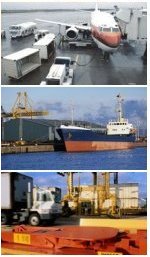

 |
 |
 |
Articles & Information<<Back to Articles/Information Index>> “FREE” TRADE AGREEMENTS – BEWARE OF YOUR GOODS NOT GETTING IN WITH PREFERENTIAL DUTY RATES- BY ROSS BECROFTWith the recent spate of Australian bilateral FTAs with Singapore, Thailand and the United States, traders and their agents need to be aware of any potential problems with the composition, manufacture or shipment of goods that might result in them not being covered by the Agreements and therefore not receiving preferential duty status. In order for traders to have the benefit of bilateral FTAs, their goods will usually have to comply with what are known as Rules of Origin. Agreements usually set out detailed rules of this kind in order to ensure that only goods that are legitimately being traded between the two countries receive the benefits negotiated in such an agreement. Defining what “originating” goods may be very complex. For example, in the case of sophisticated manufactured products, the raw materials or components may be sourced from third countries and then may undergo a process of manufacture in the country of export. Rules of origin therefore typically involve a requirement for minimum local content or value or may be based on the tariff classification of the goods at the time of export. There are often specific rules in place for the textile, clothing, automotive, plastics and chemicals industries. In addition working out whether goods qualify for origin, there is the process by which this needs to be proven to customs authorities. Most commonly, this is done with a Certificate of Origin whereby traders usually certify that the minimum origin requirements have been satisfied. However, in some Agreements, such as the US FTA, no Certificate is required, but rather sufficient evidence needs to be available to show that the rules have been met. This will often mean that the exporter will have to liaise extensively with other parties that have been part of the value chain. Another issue to highlight is whether transhipment of goods will mean that preference is lost. For example, if goods are exported from the United States and are unloaded and stored in Singapore for a period before being shipped to Australia, would they no longer be considered to originate from the United States. Logic would dictate that this should not be the case. What about if the goods are unpacked and some supplementary process (eg polishing) is undertaken? Rules of origin and other aspects of FTAs are frequently complex and our firm regularly advises on such issues. It may also be possible to obtain advance rulings from customs authorities on questions of origin and our firm would be pleased to assist with any submissions or advice in this regard. |
|
|
Home |
Our Services |
Our People The information you obtain at this site is not, nor is it intended to be, legal advice.
Copyright ©2007 by Gross & Becroft lawyers . All rights
reserved. |